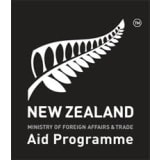
The New Zealand Aid Programme is the New Zealand Government's international aid and development programme within the Ministry of Foreign Affairs and Trade.
Through the programme, New Zealand's aid efforts concentrate on activities that contribute to poverty reduction through sustainable economic development; create safe, secure and inclusive societies; fulfil basic needs; and focus on sustainability.
HOW AID IS DELIVERED
The New Zealand Aid Programme is made up of 33 programmes in a range of countries and sectors, all with their own development challenges and objectives.
The New Zealand Aid Programme is managed by the New Zealand Ministry of Foreign Affairs and Trade and based in Wellington. The programme has an on-the-ground presence with local and New Zealand staff in the countries and regions in which the New Zealand Aid Programme operates.
GEOGRAPHIC FOCUS
The New Zealand Aid Programme focuses on the Pacific and also has programmes in Asia, Latin America and Southern Africa.
THE PACIFIC
The Pacific is a part of the world where New Zealand has the scale, resources, people and relationships that can influence positive and real change and make lasting differences in people’s lives. Over half of New Zealand's aid expenditure is spent in the Pacific.
An increasing proportion of funding will be allocated towards economic-growth focused activities in the Pacific. New Zealand's largest bilateral programmes in the Pacific are in countries with the greatest basic needs: Papua New Guinea, Solomon Islands, and Vanuatu.
There are also major bilateral country development partnerships with Cook Islands, Tonga, Samoa, Kiribati, Fiji, Tuvalu, Niue, and Tokelau. New Zealand's assistance to Polynesia (Samoa, Tonga, and the Cook Islands) will modestly increase until 2011/12. Key sectors supported are economic growth, infrastructure, education, law and justice, and health.
New Zealand's aid also focuses on outcomes central to development in the Pacific including:
- fostering sustainable economic growth and improved livelihoods
- investing in people through health and education
- strengthened governance
- reduced vulnerability, through communities that are better prepared for natural disasters
- helping reverse the growing incidence of lifestyle diseases and HIV and AIDS
- provision of access to clean water and good sanitation.
ASIA
Asia has the largest portion of the world's poor people. New Zealand, with a wide range of links in Asia, helps to meet development challenges in six priority countries. Priority areas include:
- support for basic education and the achievement of the goal of 'Education For All'
- regional and bilateral country programmes in Cambodia, Lao and Timor-Leste, which are among the poorest countries in Asia
- bilateral country programmes in Indonesia and the Philippines.
LATIN AMERICA
New Zealand is a modest donor with limited capacity in Latin America. New Zealand's emphasis in the region is to therefore add value to the endeavours of those already working there. The New Zealand Aid Programme focuses on three sub-regions in Latin America:
- Andean Peru, Bolivia and Ecuador
- Central America
- Brazil and the Southern Cone
SOUTHERN AFRICA
New Zealand is a modest donor in Southern Africa. The New Zealand Aid Programme focuses on basic health and related aspects of livelihoods including:
- maternal and child health, nutrition, HIV and AIDS, and the associated
- livelihoods of vulnerable children, youth and women.
As a modest donor, geographically distant from Africa, the New Zealand Aid Programme funds three non-government organisations (NGOs) and a United Nations organization working in Zambia and Zimbabwe to deliver relevant programmes. Under the New Zealand Aid Programme’s Africa Strategy, New Zealand's relationship with South Africa is progressively moving to one of mutual benefit based on people-to-people and government-to-government exchange.
PRIORITY AREAS
|
Sustainable economic development |
Education |
|
Environment |
Gender equality |
|
Health |
Human rights |
|
Humanitarian and emergency response |
Leadership and governance |
|
Peace building and conflict prevention |
|


